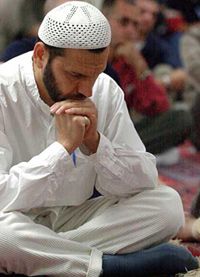A U.S. government study declassified in September 2006 says the Iraq war has become a uniting cause for "Muslim jihadists." The term "jihad" has become a household word throughout much of the world in the last decade, and to many people -- especially non-Muslims -- it means "holy war," an attempt to spread the Muslim religion and punish non-believers by violent means. A large number of Muslims, however, disagree with that definition. And the Qu'ran, like most holy books, leaves itself open to interpretation. Here we will look to the Qu'ran and to Muslim scholars to learn about some of the more widely accepted interpretations of the divine calling to jihad.
The word jihad comes from the Arabic word jahada, which means "to struggle, make effort or strive." Jihad is a core concept in the Muslim religion, and in its Islamic context, it has two primary meanings: to struggle for the betterment of oneself within the guidelines of Islam, and to struggle for the betterment of all mankind by spreading the influence of Islam and the Muslim prophet Muhammad.
Advertisement
The idea of jihad as the struggle to be a better Muslim is considered by many to be the "greater jihad." This jihad is an inner fight, not an outer one. The prophet Muhammad is reported to state:
This inward, spiritual jihad has Muslims struggling to forsake sin, control their anger, and generally improve their adherence to the directives of the prophet Muhammad. Some scholars believe that Muslims must undertake this inner, spiritual jihad before they can address their responsibility to conduct an outer, physical jihad.
While there are experts on Islam who consider this to be a modern interpretation intended to counteract the Western view of jihad as threatening and aggressive, others believe it is as well represented in the teachings of Mohammed as the outward, combative jihad.
This latter interpretation of jihad -- as a physical, outward struggle to spread the rule of Islam -- is well represented in the Qu'ran. One of most often quoted passages to support a physical jihad reads:
Surah ix.5,6
In this outer jihad, Muslims are ordered to use combative means if necessary to spread the peace and justice of the Islamic religion to areas not under the influence of the prophet Muhammad. In this passage, those who will not accept Muslim rule face the penalty of death. Many scholars point out that while the means are aggressive, the physical jihad aims for ultimate peace: The Qu'ran assumes a state of disorder, oppression and injustice in all lands not under Muslim rule. Also, some read the text to mean that the goal is not necessarily to convert the world to Islam, but instead to free the world from oppressive (non-Islamic) rulers so that all people may be free to choose Islam once they recognize its value.
Both types of jihad find their basis in interpretations of the Muslim holy book. It is worth noting that nearly every ancient religious text contains passages that, for most followers of the religion, do not apply to modern life or are not intended to be interpreted literally. "Islam" comes from the Arabic word "salam," which means peace. Most followers of Islam do not believe that violence is a proper means of conducting jihad unless that violence is in self-defense.
While most Muslims do accept some form of the directive of jihad as part of their belief system, they also completely reject the association between jihad and modern terrorism. They look to Muhammad's specific orders in the Qu'ran to never attack women, children, the elderly, the weak, the sick and the disabled as proof that terrorist tactics are not endorsed by the Qu'ran and have no place in Islam.
For more information on jihad, Islam and related topics, check out the following links:
- How Ramadan Works
- CQ Press: Jihad
- Islam.com - Web portal for Islam-related topics
- ReligiousTolerance.org: Islam
Advertisement
